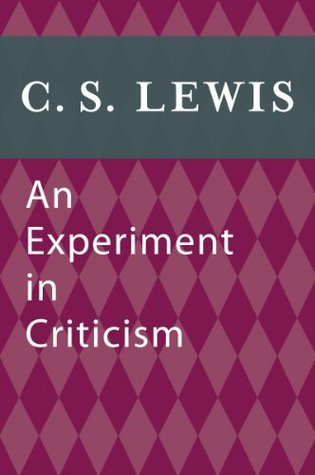More on this book
Community
Kindle Notes & Highlights
We must use our eyes. We must look, and go on looking till we have certainly seen exactly what is there. We sit down before the picture in order to have something done to us, not that we may do things with it. The first demand any work of any art makes upon us is surrender. Look. Listen. Receive. Get yourself out of the way. (There is no good asking first whether the work before you deserves such a surrender, for until you have surrendered you cannot possibly find out.)
The distinction can hardly be better expressed than by saying that the many use art and the few receive it.
The young person who has only recently discovered that there is in music something far more lastingly delightful than catchy tunes may go through a phase in which the mere occurrence of such a tune in any work makes him disdain it as ‘cheap’. And another young man, at the same stage, may disdain as ‘sentimental’ any picture
whose subject makes a ready appeal to the normal affections of the human mind. It is as if, having once discovered that there are other things to be demanded of a house than comfort, you then concluded that no comfortable house could be ‘good architecture’.
judge the instrument by anything rather than its power to do the work it was made for; treat language as something that ‘is’ but does not ‘mean’; criticise the lens after looking at it instead of through it.
success stories, certain love stories, and certain stories of high life. These are the favourite reading of readers in the lowest class; lowest, because reading takes them least out of themselves, confirms them in an indulgence which they already use too much,
the more completely a man’s reading is a form of egoistic castle-building, the more he will demand a certain superficial realism, and the less he will like the fantastic. He wishes to be deceived, at least momentarily, and nothing can deceive unless it bears a plausible resemblance to reality.
1. A work of (whatever) art can be either ‘received’ or ‘used’. When we ‘receive’ it we exert our senses and imagination and various other powers according to a pattern invented by the artist. When we ‘use’ it we treat it as assistance for our own activities. The one, to use an old-fashioned image, is like being taken for a bicycle ride by a man who may know roads we have never yet explored. The other is like adding one of those little motor attachments to our own bicycle and then going for one of our familiar rides.
No poem will give up its secret to a reader who enters it regarding the poet as a potential deceiver, and determined not to be taken in. We must risk being taken in, if we are to get anything. The best safeguard against bad literature is a full experience of good; just as a real and affectionate acquaintance with honest people gives a better protection against rogues than a habitual distrust of everyone.


